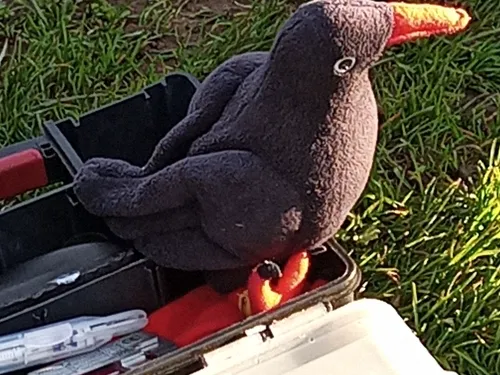
Temple Ewell’s Chough Champions
Temple Ewell is a proud to be the pilot school for Chough Champions, a recent addition to the Wilder Kent Awards. Learn more about the initiative here.
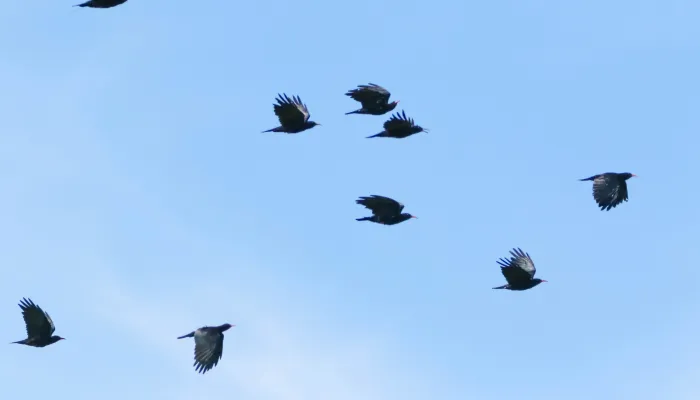
Get personal with our chough project and learn about the individual chough that are part of the cohort of chicks being released in Dover.
Released in July 2023, meet the eight red-billed choughs who are now soaring over the White Cliffs of Dover. The flock is made up of two cohorts; five birds that hatched in 2023 and three who hatched in 2022. The younger cohort was released first exploring Dover’s chalk grasslands shortly after fledging. A few weeks later, once the chicks had settled in, the older birds were released.
The birds were part of a breeding programme led by Paradise Park Cornwall and raised by staff from Wildwood Trust, affectionately nicknamed the “chough Mums.”
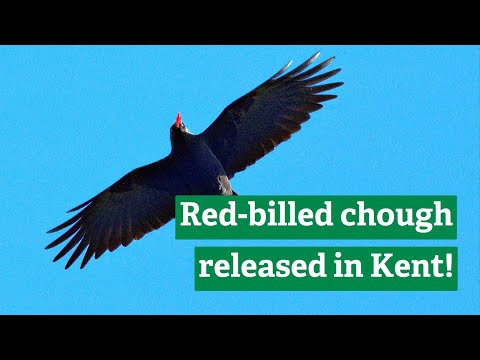
Tim Horton
Initially, the first cohort of choughs was to be released in the summer of 2022. However, delays to the release caused by adverse weather and other circumstances meant that the decision was taken to recapture the birds before the release process was complete and postpone it to 2023.
However, some of the 2022 birds did experience being out in the wild, navigating several test flights before the weather conditions deteriorated.
While both cohorts of birds bred in 2022 and 2023 were successfully released in summer 2023 and are all now at full liberty, it was the chicks that hatched in Spring 2023 that had the honour of being the first red-billed choughs in 200 years to fly freely through the skies of Kent.
When the team started working with the choughs, identifying them was easy. They were simply named after the colour of the leg ring they sported. However, as they multiplied in number, the chough Mums quickly realised this trend had limitations, so names were brought into the equation.
Starting at the beginning, the new chicks had names that begun with A, and the five were called Ash, Attenborough, Aiden, Aristotle and Arwyn. The 2024 chicks will all have names that begin with B.
Ash is a hand-reared female who sports two green-leg rings. She hatched at Paradise Park along with her sibling Aiden and another female Attenborough. Ash spends more time hanging out with Attenborough than her sister Aiden. Possibly because they fledged at the same time whilst Aiden took a bit longer.
Ash is inquisitive, bold and adventurous. When she first left her nest she would investigate every nook and cranny in the aviary including the staff’s shoelaces. Along with Attenborough, she was the first to explore the wider landscape upon her release.
Attenborough is a hand-reared female with two purple leg rings. She was hatched at Paradise Park in Cornwall and is often observed with Ash, she was raised with Ash and Aiden, but is not directly related though they behave like siblings. She, like Ash, is one of the more adventurous birds and was named Attenborough because she shares a birthday (8th May) with Sir David himself!
Aiden is a hand-reared female who was hatched at Paradise Park and she is identified by her two orange leg rings. She is Ash’s sister and was the smallest of the 2023 chicks, however, she is now catching up with her cohort in stature! She is the most reserved of the class of 2023 chicks, and while she is very sociable, she is not particularly bonded to any one bird. At the moment, Aiden is missing a tail feather, so she is one of the easier to identify as she has a V-shaped notch in her tail.
Aristotle is a hand-reared male who hatched at Wildwood along with his sibling Arwyn. Staff began hand-rearing Aristotle and Arwyn when they were just four days old. When they were old enough they moved in with Attenborough, Ash, and Aiden and crèche-reared together.
Aristotle can be identified by his two pink leg rings. He is the biggest and loudest of all the choughs and was the first chick to start vocalising, something that has continued as he has grown!
Staff named him Aristotle because of how much he talks, although you probably wouldn’t want to follow his philosophies. His bold and confident nature has got him into a couple of scrapes resulting in minor injuries requiring extra care from the “Chough Mums." Despite this, he continues to explore courageously.
Arwyn hatched at Wildwood Trust, and can be identified by her two yellow leg rings. She is often seen with her brother Aristotle and is described by the “Chough Mums” as a quiet bird (probably because she can’t get a tweet in over Aristotle). She is sometimes drawn into Aristotle’s adventures. Unlike him, she has never been injured but often keeps her unruly brother company when he is on “nest rest.” Staff joke that this is when they become ‘grounded teenagers’.
Red is a hand-reared male hatched at Wildwood Trust. He is often seen with white and was one of the first birds to explore during the trial release of 2022. He lived free for several days before weather conditions changed and he had to come back until the following year, now fully released, he is thriving.
White is a parent-reared bird from Wildwood. She fledged in the aviary at Wildwood Trust rather than at the release site as the 2023 chicks did. This means that she has a slightly different perspective on the world, often being a bit more cautious around staff. Nevertheless, she is confident when flying around Dover, sociable, and loves foraging in dung! She has formed a bond with Red and the two will chill out together allopreening (i.e. grooming each other's feathers). It's early days, but this could be our first breeding pair in Dover!
Pink is a parent-reared bird who fledged at Paradise Park Cornwall. She moved to the release site with Red and White in 2022. Having known them the longest, she naturally stuck close to them when first released. But she seems equally happy hanging out with the 2023 cohort. Maybe she feels like a third wheel with Red and White?
Pink is a survivor! Within the first few days of release, a young peregrine (a chough’s natural predator and enemy numero uno) dived on the flock at the supplemental feed. He didn’t succeed in catching any but it did result in Pink getting split off from the group. She found refuge with a flock of jackdaw in a nearby field for a few hours before making her way back to the choughs.
Wildwood Trust staff are excited to see the first chough eggs of this season beginning to hatch. We currently have 3 chough pairs nesting so it looks like it will be a busy but successful breeding season. Chicks reared at Wildwood will be released later this season – keep an eye on our social media and websites for updates.
Over in Dover the eight red-billed choughs are doing well and are showing exactly the behaviours the team would expect. The birds appear to be heading regularly to the Dover Castle and to the National Trust’s White Cliff’s Visitor Centre where they have been seen foraging with a group of jackdaws.
All 3 GPS tags were removed and charged in early March.
Background: GPS tags have a much shorter battery life than some of the other tags used. They can be recharged and the data downloaded but this requires the bird in the hand. To minimise stress on the bird, and get the most out of our post-release monitoring, we recall the birds to the aviary at the afternoon supplemental feed and shut them in. The bird is then hand-netted and tags removed.
All eight birds will then remain shut in the aviary overnight until the chough Mums return in the morning to refit the tag. The birds are then monitored to check the refit is comfortable and not causing any issues then give the group access back outside.
They normally return to the aviary to roost, so they don't feel too stressed about being confined to the aviary as it is close to their 'bedtime'.
PUBLIC SIGHTING!
Through Facebook the team noticed that the birds had been spotted at Dover Castle, they have a favourite spot at the West side walls close to Peverells Tower and the restaurant which overlooks Dover.
The team have also spotted them for a short period exploring East Cliff, but they still seem to prefer the manmade cliffs of the Castle. Since December the birds have been regularly heading to the castle after sunrise and enjoying the scenery until mid-morning returning to hunt invertebrates and forage through the sheep-grazed site throughout the day.
The chough Mums have noticed the birds tend to head back to the aviary when the castle gets busy.
1-min interview with Mary, our amazing Chough Release Technician:
“As the chough release technician, I spend a lot of time with the eight free-living choughs in Dover, feeding them and monitoring them on a daily basis to make sure they are safe and healthy. I also track them to see where they go on their daily adventures!
“It has been amazing to see the birds that started out as tiny chicks grow in size and confidence to become fully fledged (literally) adults flying around and exploring."

Temple Ewell is a proud to be the pilot school for Chough Champions, a recent addition to the Wilder Kent Awards. Learn more about the initiative here.
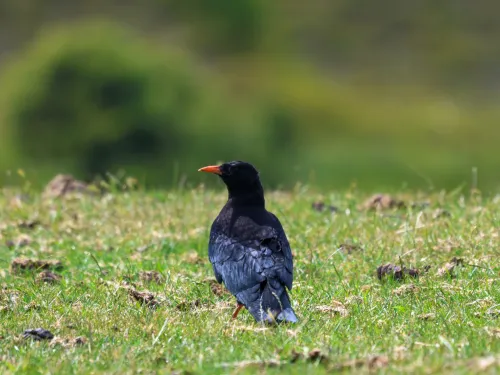
Conservationists celebrate landmark moment in bid to return red-billed choughs to South East England.
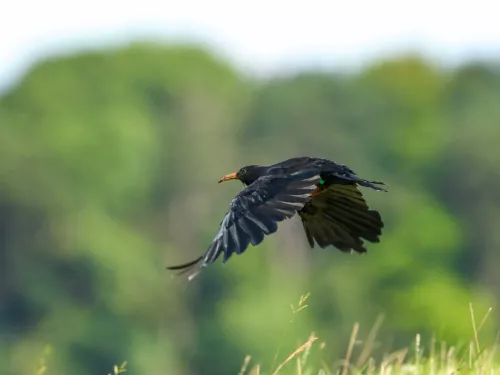
Kent Wildlife Trust's Chough Appeal is more than just a conservation initiative—it’s a powerful tool for community engagement and education. This blog is written by Jenny Luddington, the Youth Education and Engagement Officer for Kent Wildlife Trust...